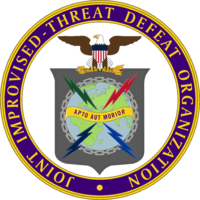Joint Improvised Explosive Device Defeat Organization
 |
|
| Agency overview | |
|---|---|
| Formed | February 14, 2006 |
| Headquarters | The Pentagon |
| Employees | 400 government civilians and military personnel; ~575 contract personnel |
| Annual budget | $450 million for fiscal year 2015 |
| Agency executives |
|
| Parent agency | Defense Threat Reduction Agency |
| Website | https://www.jieddo.mil |
The Joint Improvised-Threat Defeat Organization (JIDO, pronounced like "JI-DOH") is a combat support organization of the U.S. Department of Defense (DoD) organization under the Defense Threat Reduction Agency (DTRA) that deals with improvised threats such as the improvised explosive device (IEDs). JIDO was born from the Joint IED Defeat Organization established in 2006, which focused on IEDs. JIDO's mission is to "enable Department of Defense actions to counter improvised threats with tactical responsiveness and anticipatory acquisition in support of combatant commanders' efforts to prepare for, and adapt to, battlefield surprise." This mission supports counter-terrorism, counter-insurgency and other related mission areas including Counter-IED.
The change from JIEDDO to JIDA occurred when Deputy Defense Secretary Robert Work approved an organizational realignment of JIEDDO from a joint wartime activity to a combat support agency under the authority, direction and control of the Under Secretary of Defense for Acquisition, Technology and Logistics. Under the 2016 Defense Authorization Act, DoD was directed to moved JIDA to a military department or under an existing defense agency. DoD decided to reclassify JIDA as an organization under DTRA. On September 30, 2016, JIDA moved under DTRA and officially changed its name to JIDO to reflect the change from an Agency to an Organization.
Operating under the authority of the USD(AT&L), JIDO's director serves as the principal adviser to the Department on IED matters. JIDO is organized along a coordinating staff structure with divisions aligned under a chief of staff. Additionally, there are deputy directors who help focus mission areas across the joint staff.
Under JIDO, there were three primary lines of operation: attacking the network, defeating the device, and training the force. Congress funds JIEDDO along these lines of operations.
JIDO's "Attack the Network" operation enabled offensive operations against networks of financiers, IED makers, trainers, and supporting infrastructure by providing intelligence, surveillance, reconnaissance, information operations, counter-bomber targeting, biometrics, and weapons technical intelligence.
...
Wikipedia
